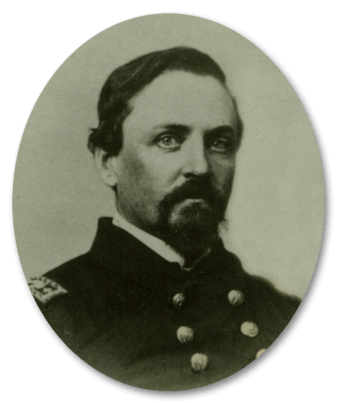Ship's Crew

Oscar C. Badger
Rank(s): Captain
Dates of Service: 1/9/1878 - 8/2/1879
Birth Date: 8/12/1823
Death Date: 6/20/1899
Oscar Badger was born in Mansfield, Connecticut on August 12, 1823. He graduated from the U.S. Naval School, as the early U.S. Naval Academy was called, in 1847. He served on several ships of the Pacific Squadron before joining the Naval Observatory in Washington, D.C. in 1853. Promoted to lieutenant in 1855, he returned to the Pacific Squadron and there served at the Washington Navy Yard until the American Civil War. He first commanded the steamer Anacostia in Chesapeake Bay, but transferred to the western theater to superintend gunboats outfitting there. In mid-1863, he served with the North Atlantic Blockading Squadron and commanded the monitors Patapsco and Montauk in repeated attacks against Charleston Harbor’s forts. In September 1863, he was severely wounded during an attack on Fort Sumter and spent the rest of the war on duty at the Philadelphia Navy Yard. Promoted to commander, he commanded the sidewheel steamer Peoria in the North Atlantic Squadron from 1866 to 1868. He spent 1868 to 1871 at the Portsmouth Navy Yard, before commanding the screw sloop Ticonderoga in the South Atlantic until 1873, during which time he was promoted to captain.
Badger took command of Constitution on January 9, 1878 at Philadelphia, where the ship was being prepared to carry the U.S. exhibits to the 1878 Exposition Universelle in Paris. Perhaps the most interesting item in her cargo was a railway steam engine and two cars, all lashed topside on the spar deck. The March 1878 voyage to Le Havre, France was a tumultuous one, but fortunately the ship and her strange cargo rode well. With the exhibits delivered, the ship was left with nothing to do for the duration of the exposition. In December, all the exhibits were loaded back on board and the trip home begun in mid-January 1879. A navigational error caused the ship to run aground on the English coast the next morning, but she was gotten off with little damage, and the voyage resumed before the end of the month. The stormy seas continued, however, and after a week of constant pounding the head of the rudder carried away, leaving the ship floundering. Nevertheless, Badger and his crew managed to rig a make-do rudder good enough to get them to Lisbon, Portugal, where a proper rudder was installed. Three men who had braved the seas to work over the stern later each received the Medal of Honor. The rest of the voyage was conducted without incident.
Badger’s seagoing days were over. Following brief assignments in Washington and Philadelphia, he was promoted to commodore and assumed command of the Boston Navy Yard until 1885, when he retired. He died on June 20, 1899.
The Commodore’s service has been recalled in the naming of a screw steamer (1898) and a destroyer (1919).